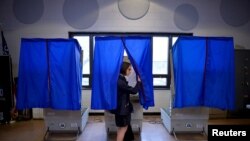Top U.S. law enforcement, military and intelligence officials are expressing confidence in their ability to maintain the security of the upcoming presidential election, despite mounting evidence that several countries remain intent on meddling with the vote.
Officials have been bracing for some sort of attack on the election for nearly four years, ever since the U.S. intelligence community concluded Russia sought to interfere in the 2016 U.S. presidential election. But with less than 50 days until voters head to the polls on November 3, they say there are no signs Russia or anyone else is trying to hack critical election systems.
"We haven't seen cyberattacks to date this year on voter registration databases or on any systems involved in primary voting," FBI Director Christopher Wray said Wednesday at a virtual summit hosted by the U.S. Cybersecurity and Infrastructure Security Agency (CISA).
And despite describing the FBI’s efforts to protect critical U.S. systems as a “never-ending battle,” Wray said it appears precautions put in place since the 2016 election are paying off.
"To our knowledge, no foreign government has attempted to tamper with U.S. vote counts," he said.
Speaking at a separate virtual conference Wednesday, the commander of the U.S. Cyber Command also sought to assure voters ahead of Election Day.
"I am very confident we will have a tremendous, continuing success based upon the work that has really come together across the interagency (government) and with our partners,” said General Paul Nakasone, who is also director of the National Security Agency.
These assessments are in line with others offered by high-ranking U.S. officials in recent weeks about the threat to the presidential election — that while U.S. adversaries such as China, Russia and Iran are seeking to interfere with the election, those efforts have yet to penetrate systems the country will rely on to conduct the vote.
“This will be the most secure election in modern history," CISA Director Christopher Krebs said last week, repeating a phrase he has used numerous times since July.
As part of the efforts to secure the election, the U.S. government has been working with states to increase the number of sensors watching for malicious cyberactivity. More than 90% of the country’s voting precincts now have systems in place to ensure there is a paper record of every vote cast, just in case something goes wrong.
Senior officials have also downplayed concerns raised by President Donald Trump that an increased reliance on mail-in ballots due to the coronavirus pandemic could lead to “the most RIGGED Election in our nations (sic) history.”
“We have no information or intelligence that any nation-state threat actor is engaging in any kind of activity to undermine any part of the mail-in vote or ballots,” a senior U.S. intelligence official said last month, while briefing reporters on the condition of anonymity.
Yet while U.S. officials are confident in the country’s strengthened voting infrastructure, they remain concerned about how adversaries are aiming to alter the outcome of the election with influence campaigns and propaganda.
On Wednesday, Nakasone described influence operations as a threat that is only likely to get worse as technology continues to advance.
“Influence operations, just in general, for us will be one of the things that we'll be dealing with not just every two or four years," he said. “I think we're going to see it in our diplomatic processes. We're going to see it in warfare. We're going to see it in sowing civil distrust in different countries.”
There are signs that China, Russia and Iran are ramping up their efforts.
Last week, Microsoft announced it had uncovered evidence that hackers linked to all three suspect countries have been actively targeting Trump’s reelection campaign, as well as the campaign of his main challenger, former Vice President Joe Biden.
“Foreign activity groups have stepped up their efforts targeting the 2020 election as had been anticipated, and is consistent with what the U.S. government and others have reported,” Tom Burt, Microsoft corporate vice president for customer security, wrote in his blog last week.
“The majority of these attacks were detected and stopped by security tools built into our products,” he added.
Last month, William Evanina, director of the National Counterintelligence and Security Center, warned that China, Russia and Iran were all seeking to “undermine the American people’s confidence in our democratic process.”
In that rare public assessment, Evanina said Russia appeared intent on hurting the Biden campaign, while some Kremlin-linked actors were “seeking to boost President Trump’s candidacy on social media and Russian television.”
Evanina said both China and Iran appeared to favor Biden’s candidacy.
But despite the concerns, there are lingering questions about what type of impact the Chinese, Russian and Iranian influence operations will have on U.S. voters when they actually cast their ballots.
“Even if you can attribute an operation, even if you can really gather as much, it’s very hard to assess what the impact is,” said Daniel Kimmage, the principal deputy coordinator of the U.S. State Department’s Global Engagement Center. “It remains, I think, one of the outstanding challenges in this field.”




